SOCF311 Foundations: Nutritional Medicine's Contribution to Health
VerifiedAdded on 2023/04/08
|5
|643
|183
Essay
AI Summary
This essay discusses the role of nutritional and dietetic medicine in public health, highlighting its background, mode of action, and evidence of efficacy. It emphasizes the importance of balancing nutrients within the body to prevent and treat diseases, explaining how nutritional medicine aims to balance body chemistry by ensuring an adequate supply of essential building blocks. The essay also touches upon both contemporary and traditional evidence supporting the benefits of nutritional medicine, including its ability to improve immunity, concentration, digestion, energy levels, and sleep quality. The increasing demand for nutritional medicine due to changing lifestyles and its holistic approach to health are also addressed. Desklib offers a wealth of similar resources for students.
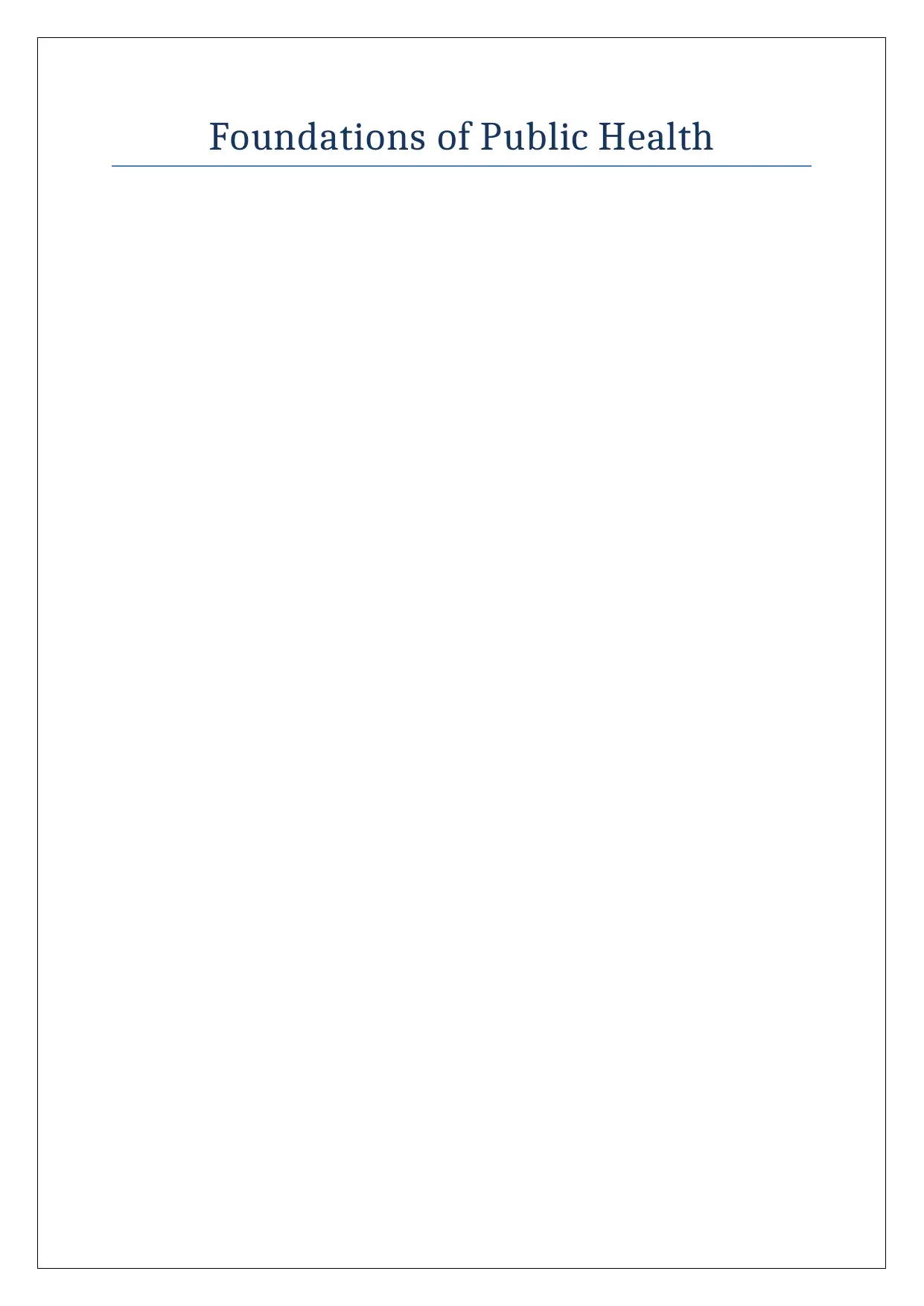
Foundations of Public Health
Paraphrase This Document
Need a fresh take? Get an instant paraphrase of this document with our AI Paraphraser
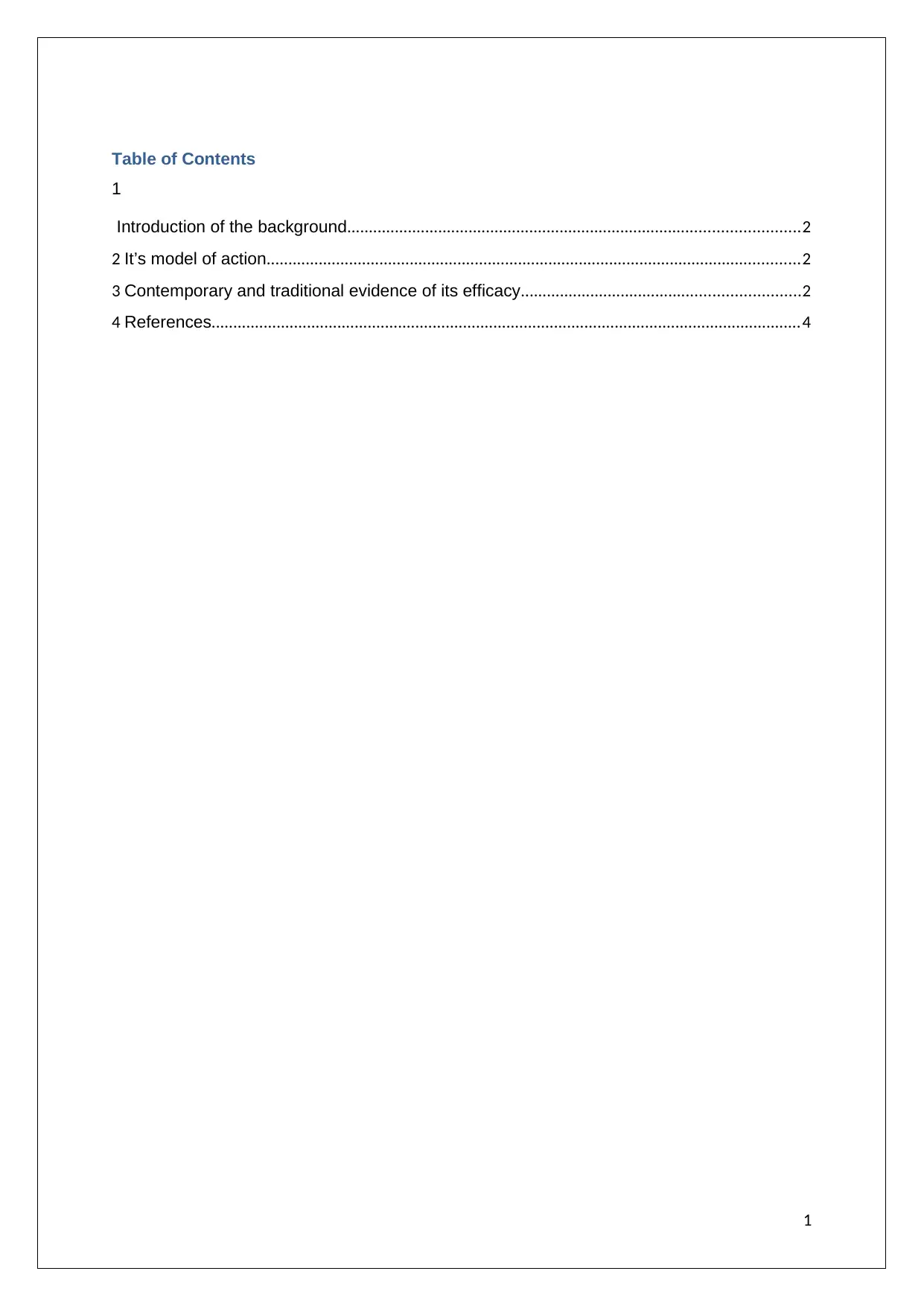
Table of Contents
1
Introduction of the background........................................................................................................2
2 It’s model of action...........................................................................................................................2
3 Contemporary and traditional evidence of its efficacy................................................................2
4 References........................................................................................................................................4
1
1
Introduction of the background........................................................................................................2
2 It’s model of action...........................................................................................................................2
3 Contemporary and traditional evidence of its efficacy................................................................2
4 References........................................................................................................................................4
1
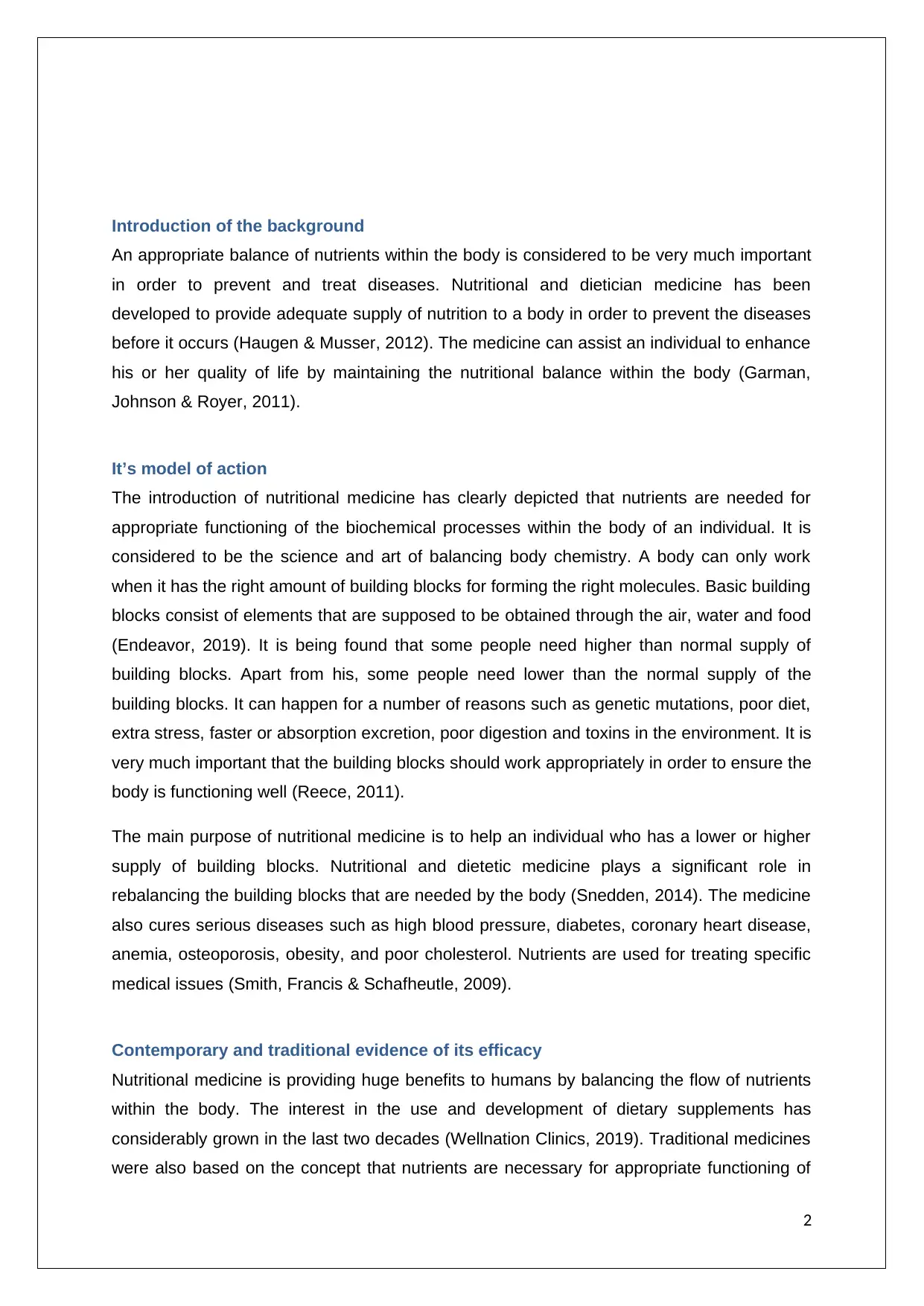
Introduction of the background
An appropriate balance of nutrients within the body is considered to be very much important
in order to prevent and treat diseases. Nutritional and dietician medicine has been
developed to provide adequate supply of nutrition to a body in order to prevent the diseases
before it occurs (Haugen & Musser, 2012). The medicine can assist an individual to enhance
his or her quality of life by maintaining the nutritional balance within the body (Garman,
Johnson & Royer, 2011).
It’s model of action
The introduction of nutritional medicine has clearly depicted that nutrients are needed for
appropriate functioning of the biochemical processes within the body of an individual. It is
considered to be the science and art of balancing body chemistry. A body can only work
when it has the right amount of building blocks for forming the right molecules. Basic building
blocks consist of elements that are supposed to be obtained through the air, water and food
(Endeavor, 2019). It is being found that some people need higher than normal supply of
building blocks. Apart from his, some people need lower than the normal supply of the
building blocks. It can happen for a number of reasons such as genetic mutations, poor diet,
extra stress, faster or absorption excretion, poor digestion and toxins in the environment. It is
very much important that the building blocks should work appropriately in order to ensure the
body is functioning well (Reece, 2011).
The main purpose of nutritional medicine is to help an individual who has a lower or higher
supply of building blocks. Nutritional and dietetic medicine plays a significant role in
rebalancing the building blocks that are needed by the body (Snedden, 2014). The medicine
also cures serious diseases such as high blood pressure, diabetes, coronary heart disease,
anemia, osteoporosis, obesity, and poor cholesterol. Nutrients are used for treating specific
medical issues (Smith, Francis & Schafheutle, 2009).
Contemporary and traditional evidence of its efficacy
Nutritional medicine is providing huge benefits to humans by balancing the flow of nutrients
within the body. The interest in the use and development of dietary supplements has
considerably grown in the last two decades (Wellnation Clinics, 2019). Traditional medicines
were also based on the concept that nutrients are necessary for appropriate functioning of
2
An appropriate balance of nutrients within the body is considered to be very much important
in order to prevent and treat diseases. Nutritional and dietician medicine has been
developed to provide adequate supply of nutrition to a body in order to prevent the diseases
before it occurs (Haugen & Musser, 2012). The medicine can assist an individual to enhance
his or her quality of life by maintaining the nutritional balance within the body (Garman,
Johnson & Royer, 2011).
It’s model of action
The introduction of nutritional medicine has clearly depicted that nutrients are needed for
appropriate functioning of the biochemical processes within the body of an individual. It is
considered to be the science and art of balancing body chemistry. A body can only work
when it has the right amount of building blocks for forming the right molecules. Basic building
blocks consist of elements that are supposed to be obtained through the air, water and food
(Endeavor, 2019). It is being found that some people need higher than normal supply of
building blocks. Apart from his, some people need lower than the normal supply of the
building blocks. It can happen for a number of reasons such as genetic mutations, poor diet,
extra stress, faster or absorption excretion, poor digestion and toxins in the environment. It is
very much important that the building blocks should work appropriately in order to ensure the
body is functioning well (Reece, 2011).
The main purpose of nutritional medicine is to help an individual who has a lower or higher
supply of building blocks. Nutritional and dietetic medicine plays a significant role in
rebalancing the building blocks that are needed by the body (Snedden, 2014). The medicine
also cures serious diseases such as high blood pressure, diabetes, coronary heart disease,
anemia, osteoporosis, obesity, and poor cholesterol. Nutrients are used for treating specific
medical issues (Smith, Francis & Schafheutle, 2009).
Contemporary and traditional evidence of its efficacy
Nutritional medicine is providing huge benefits to humans by balancing the flow of nutrients
within the body. The interest in the use and development of dietary supplements has
considerably grown in the last two decades (Wellnation Clinics, 2019). Traditional medicines
were also based on the concept that nutrients are necessary for appropriate functioning of
2
⊘ This is a preview!⊘
Do you want full access?
Subscribe today to unlock all pages.

Trusted by 1+ million students worldwide
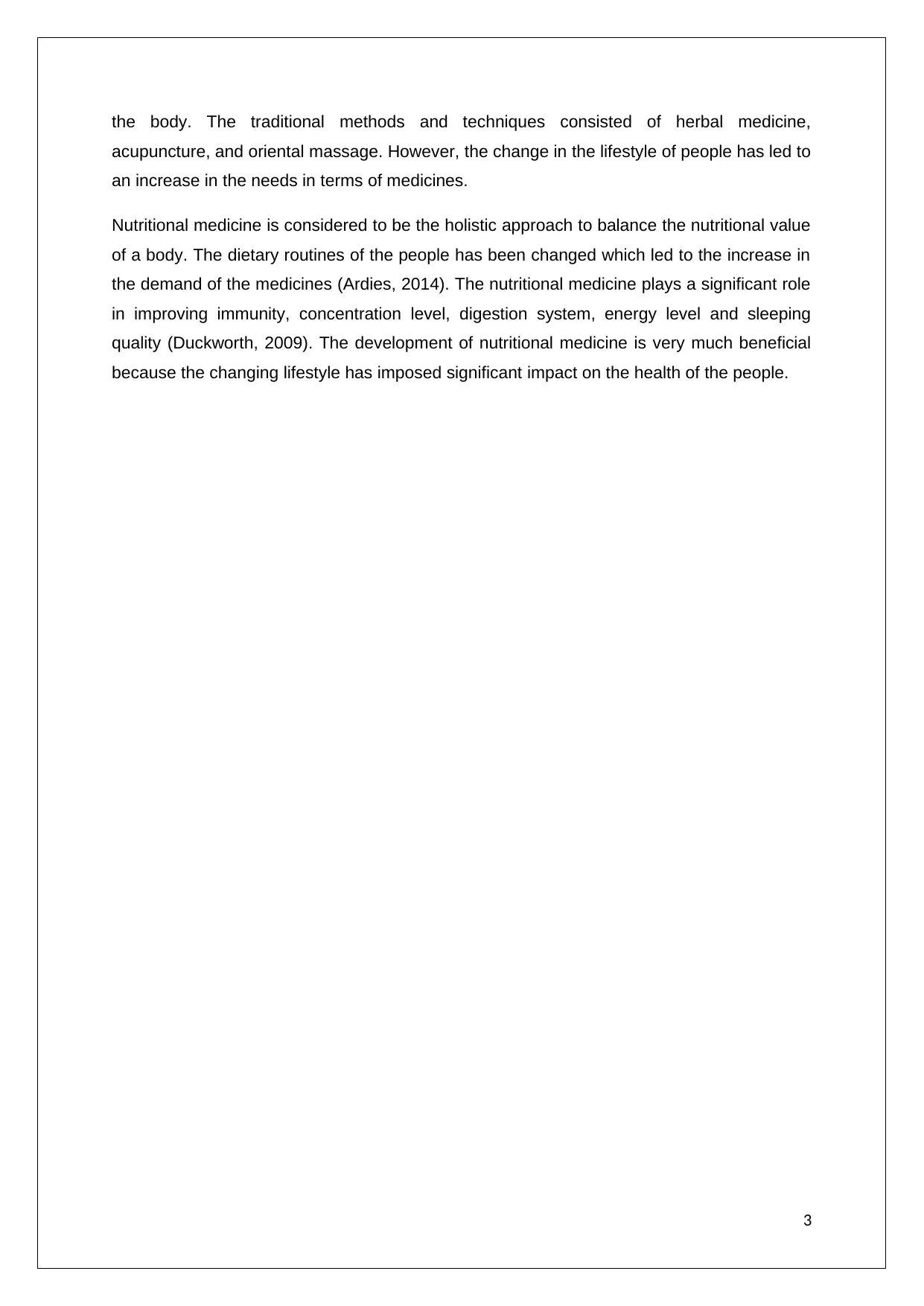
the body. The traditional methods and techniques consisted of herbal medicine,
acupuncture, and oriental massage. However, the change in the lifestyle of people has led to
an increase in the needs in terms of medicines.
Nutritional medicine is considered to be the holistic approach to balance the nutritional value
of a body. The dietary routines of the people has been changed which led to the increase in
the demand of the medicines (Ardies, 2014). The nutritional medicine plays a significant role
in improving immunity, concentration level, digestion system, energy level and sleeping
quality (Duckworth, 2009). The development of nutritional medicine is very much beneficial
because the changing lifestyle has imposed significant impact on the health of the people.
3
acupuncture, and oriental massage. However, the change in the lifestyle of people has led to
an increase in the needs in terms of medicines.
Nutritional medicine is considered to be the holistic approach to balance the nutritional value
of a body. The dietary routines of the people has been changed which led to the increase in
the demand of the medicines (Ardies, 2014). The nutritional medicine plays a significant role
in improving immunity, concentration level, digestion system, energy level and sleeping
quality (Duckworth, 2009). The development of nutritional medicine is very much beneficial
because the changing lifestyle has imposed significant impact on the health of the people.
3
Paraphrase This Document
Need a fresh take? Get an instant paraphrase of this document with our AI Paraphraser
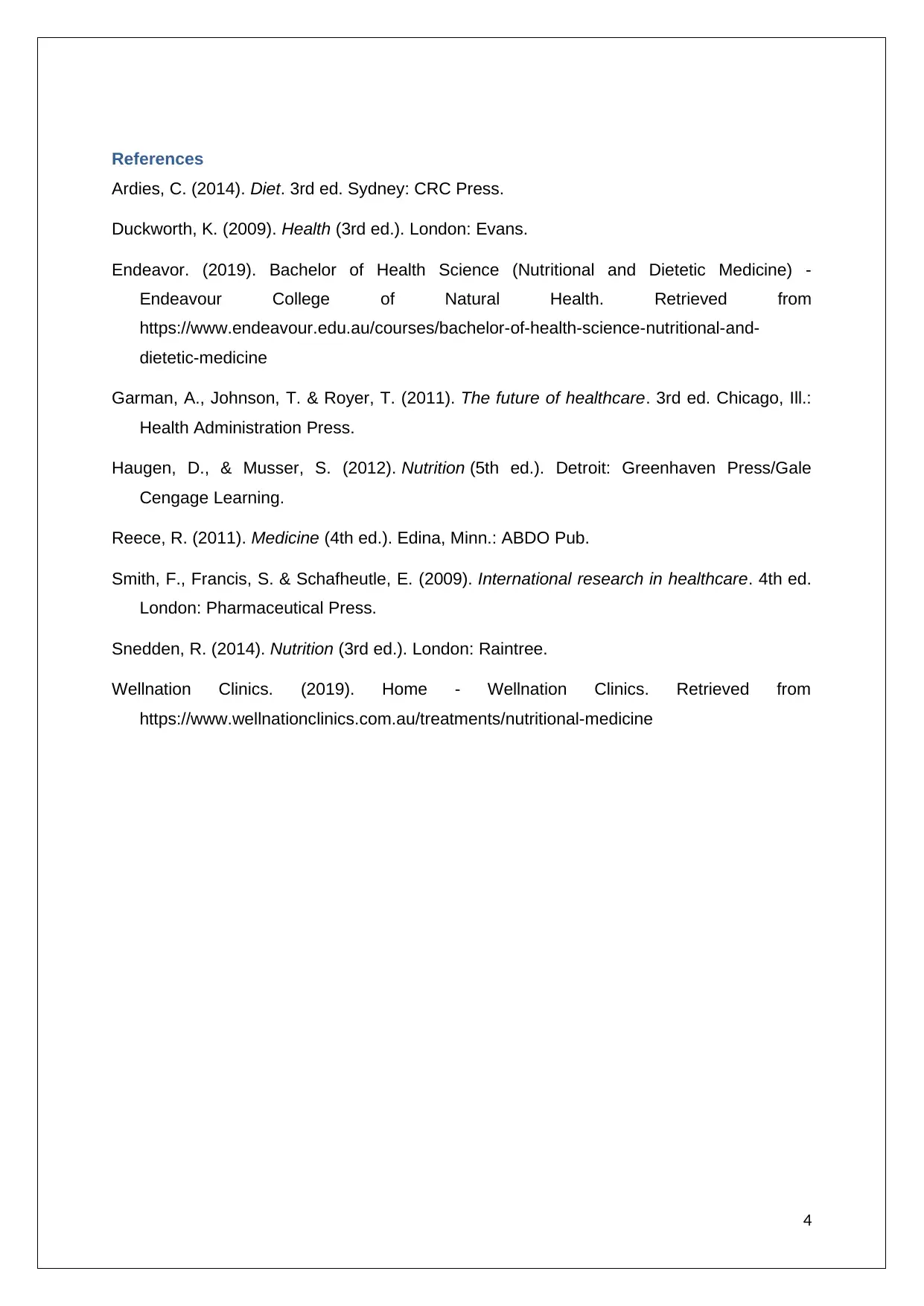
References
Ardies, C. (2014). Diet. 3rd ed. Sydney: CRC Press.
Duckworth, K. (2009). Health (3rd ed.). London: Evans.
Endeavor. (2019). Bachelor of Health Science (Nutritional and Dietetic Medicine) -
Endeavour College of Natural Health. Retrieved from
https://www.endeavour.edu.au/courses/bachelor-of-health-science-nutritional-and-
dietetic-medicine
Garman, A., Johnson, T. & Royer, T. (2011). The future of healthcare. 3rd ed. Chicago, Ill.:
Health Administration Press.
Haugen, D., & Musser, S. (2012). Nutrition (5th ed.). Detroit: Greenhaven Press/Gale
Cengage Learning.
Reece, R. (2011). Medicine (4th ed.). Edina, Minn.: ABDO Pub.
Smith, F., Francis, S. & Schafheutle, E. (2009). International research in healthcare. 4th ed.
London: Pharmaceutical Press.
Snedden, R. (2014). Nutrition (3rd ed.). London: Raintree.
Wellnation Clinics. (2019). Home - Wellnation Clinics. Retrieved from
https://www.wellnationclinics.com.au/treatments/nutritional-medicine
4
Ardies, C. (2014). Diet. 3rd ed. Sydney: CRC Press.
Duckworth, K. (2009). Health (3rd ed.). London: Evans.
Endeavor. (2019). Bachelor of Health Science (Nutritional and Dietetic Medicine) -
Endeavour College of Natural Health. Retrieved from
https://www.endeavour.edu.au/courses/bachelor-of-health-science-nutritional-and-
dietetic-medicine
Garman, A., Johnson, T. & Royer, T. (2011). The future of healthcare. 3rd ed. Chicago, Ill.:
Health Administration Press.
Haugen, D., & Musser, S. (2012). Nutrition (5th ed.). Detroit: Greenhaven Press/Gale
Cengage Learning.
Reece, R. (2011). Medicine (4th ed.). Edina, Minn.: ABDO Pub.
Smith, F., Francis, S. & Schafheutle, E. (2009). International research in healthcare. 4th ed.
London: Pharmaceutical Press.
Snedden, R. (2014). Nutrition (3rd ed.). London: Raintree.
Wellnation Clinics. (2019). Home - Wellnation Clinics. Retrieved from
https://www.wellnationclinics.com.au/treatments/nutritional-medicine
4
1 out of 5
Related Documents
Your All-in-One AI-Powered Toolkit for Academic Success.
+13062052269
info@desklib.com
Available 24*7 on WhatsApp / Email
![[object Object]](/_next/static/media/star-bottom.7253800d.svg)
Unlock your academic potential
Copyright © 2020–2026 A2Z Services. All Rights Reserved. Developed and managed by ZUCOL.





